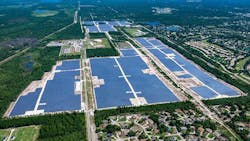GE Vernova and Duke Energy Collaborate on 100% Green Hydrogen-Fueled Peaking Power Plant
Demand for energy across the globe is rapidly increasing, making it more challenging to rely solely on intermittent, renewable energy to keep the power grid operational. However, hydrogen produced from excess renewable energy during optimal generation conditions and stored for later use by gas turbines can provide a unique solution to help reliability, affordability, and sustainability.
To that end, GE Vernova announced it will support Duke Energy’s plans to build and operate an end-to-end hydrogen system at its DeBary plant located near Orlando, Florida. With operations set to commence in 2024, the new hydrogen system will provide peak power to Duke’s customers during times of increased electricity demand.
According to the companies, the plant will be one of the first in the nation to produce and use green hydrogen to power a gas turbine for peaking power applications. GE Vernova will support the turbine integration with green hydrogen, including upgrading one of the four GE 7E gas turbines installed at the site. This will allow Duke to accommodate hydrogen fuel blends of significant volume.
“GE Vernova is thrilled to work closely with Duke Energy on this project, which is a perfect example of the interplay opportunities between renewable energy and efficient gas-fired combustion technologies and exhibits how gas turbines are an essential technology in the energy transition,” said Eric Gray, President and CEO of GE Vernova’s Gas Power business.
The project will also leverage Duke Energy’s installed solar array to operate electrolyzers to create green hydrogen, which will be stored on-site at DeBary. This green hydrogen will then be used to power the 83 MW gas turbine with up to 100% hydrogen fuel to support periods of peak electricity demand while maintaining plant reliability.
“This first-ever commercial operation of a gas turbine on 100% hydrogen will be a groundbreaking achievement for Duke Energy and for our industry. Our existing solar field and gas turbines at DeBary provide a unique opportunity for us to produce green hydrogen, store it onsite, and then combust it to ensure reliable service when electricity demand is high,” said Regis Repko, Duke Energy’s Senior Vice President of Generation and Transmission Strategy. “This combination of technologies will allow gas turbines to become decarbonized, dispatchable assets that support the addition of more renewables to our grid."
About the Author
Breanna Sandridge, Senior Editor
Breanna Sandridge is senior editor for EnergyTech and Microgrid Knowledge, both part of the energy group at Endeavor Business Media.
Prior to that, Breanna was managing editor for Machinery Lubrication and Reliable Plant magazines, both part of Noria Corp. She has two years experience covering the industrial sector.
She also is a 2021 graduate of Northeastern State University (Oklahoma) with a Bachelor's in English.
